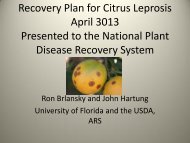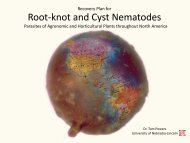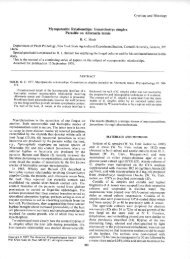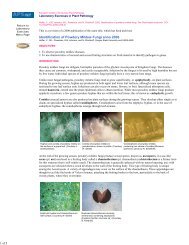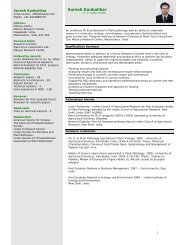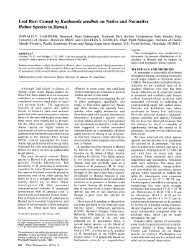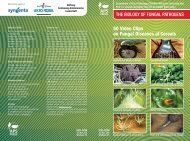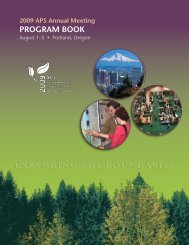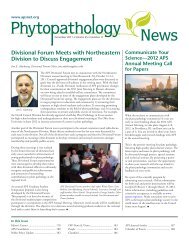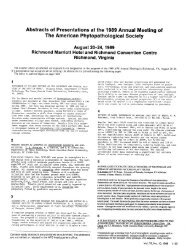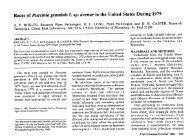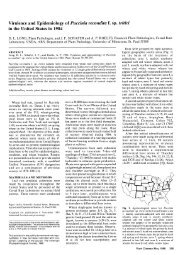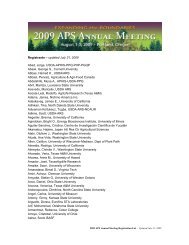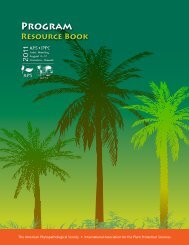See the program book (PDF) - American Phytopathological Society
See the program book (PDF) - American Phytopathological Society
See the program book (PDF) - American Phytopathological Society
You also want an ePaper? Increase the reach of your titles
YUMPU automatically turns print PDFs into web optimized ePapers that Google loves.
plenary Sessions<br />
Eight renowned speakers address <strong>the</strong> importance of agriculture<br />
and an efficient and secure food system in improving global<br />
public health. These topics are extremely relevant in today’s<br />
global society and this diverse ga<strong>the</strong>ring of industry leaders will<br />
cover many new and exciting approaches in our discipline.<br />
“Agriculture, Food Security, and Public Health: Global<br />
Issues – Global Solutions”<br />
For global health initiatives to be successful in <strong>the</strong> long term,<br />
<strong>the</strong>re needs to be a secure and affordable safe food and water<br />
system in place. All <strong>the</strong> medicines in <strong>the</strong> world can’t cure<br />
starvation. Agriculture is about producing food, feed, and<br />
fiber. Many factors will impact agriculture in <strong>the</strong> future,<br />
including such things as global climate change, <strong>the</strong> loss in<br />
plant, animal, and microbe genetic diversity (biodiversity),<br />
and <strong>the</strong> ever-increasing demand for water. On <strong>the</strong> o<strong>the</strong>r hand,<br />
many scientific breakthroughs in areas such as transgenic<br />
disease, pest-resistant and stress-resistant plants, transgenic<br />
and conventional biofortified food crops, and plant-derived<br />
pharmaceuticals will potentially have huge positive impacts<br />
on food production and public health. While <strong>the</strong>se have great<br />
potential to help alleviate much of <strong>the</strong> global food and public<br />
health crisis, sadly, many may not be adopted because of <strong>the</strong><br />
political structure in place in countries around <strong>the</strong> world.<br />
Governmental policies also may restrict and actually impede<br />
fur<strong>the</strong>r research into many critical areas of science. These are<br />
monumental issues to be sure, but not insurmountable. They<br />
are global issues and <strong>the</strong>y will require global solutions.<br />
opening plenary Session<br />
Sunday, July 27 • 8:30 a.m. – 12:00 p.m. • Auditorium<br />
8:30-8:45a.m.<br />
Ray Martyn<br />
Professor, Department of Botany and Plant<br />
Pathology, Purdue University, and APS<br />
President.<br />
“Welcome and Introduction –When<br />
Agriculture Fails”<br />
Agriculture is one of <strong>the</strong> world’s great success stories. Our<br />
ability to grow food and fiber to feed, clo<strong>the</strong> and shelter almost<br />
PROgRAM HigHligHtS<br />
The Centennial Meeting features an expanded version of our traditional plenary session.<br />
7 billion people is nothing short of remarkable. However,<br />
starvation and malnutrition is still rampant throughout much<br />
of <strong>the</strong> world. Global agriculture and, in fact, humanity<br />
itself, faces many new challenges. The increasing decline in<br />
<strong>the</strong> planet’s rich biodiversity is looming large. Global climate<br />
change will negatively impact agriculture in many ways and<br />
<strong>the</strong> conflict between water for agriculture and water for public<br />
health and sanitation continues to get worse in many areas of<br />
<strong>the</strong> world. These are global issues and <strong>the</strong>y will require global<br />
solutions. If <strong>the</strong> developed world is intent upon improving<br />
<strong>the</strong> public health of hundreds of millions, even billions of<br />
people, a revitalization of, and support for, agriculture must<br />
be a vital ‘first step’ in <strong>the</strong> process. What we do as agricultural<br />
scientists is paramount and a big piece of <strong>the</strong> solution. When<br />
agriculture fails, humanity fails. This special Centennial<br />
Plenary Session entitled “Agriculture, Food Security, and<br />
Public Health: Global Issues – Global Solutions” will address<br />
<strong>the</strong> issues discussed above.<br />
8:45-9:15 a.m.<br />
Peter Raven<br />
President, Missouri Botanical Garden<br />
and <strong>the</strong> Engelmann Professor of Botany,<br />
Washington University in St. Louis; U.S.<br />
National Academy of Sciences, 1977;<br />
past-president, A.A.A.S., 2002; and U.S.<br />
President’s Council of Advisors on Science<br />
and Technology (Carter administration).<br />
“Biodiversity and Agriculture”<br />
Since <strong>the</strong> origin of crop agriculture and animal domestication<br />
starting approximately 10,500 years ago, <strong>the</strong>re has been a<br />
steady erosion of biodiversity throughout <strong>the</strong> world with<br />
some 11% of <strong>the</strong> land surface devoted to crop agriculture<br />
and ano<strong>the</strong>r 20% to pasture on natural lands, most of it<br />
unsustainable. Natural biodiversity has decreased markedly in<br />
<strong>the</strong> face of <strong>the</strong> spread of this intensive land use. Crop diversity,<br />
in contrast, first expanded and is now decreasing in <strong>the</strong> face of<br />
commercial-scale agriculture. Where should we be aiming to<br />
preserve biodiversity for <strong>the</strong> future?<br />
17



